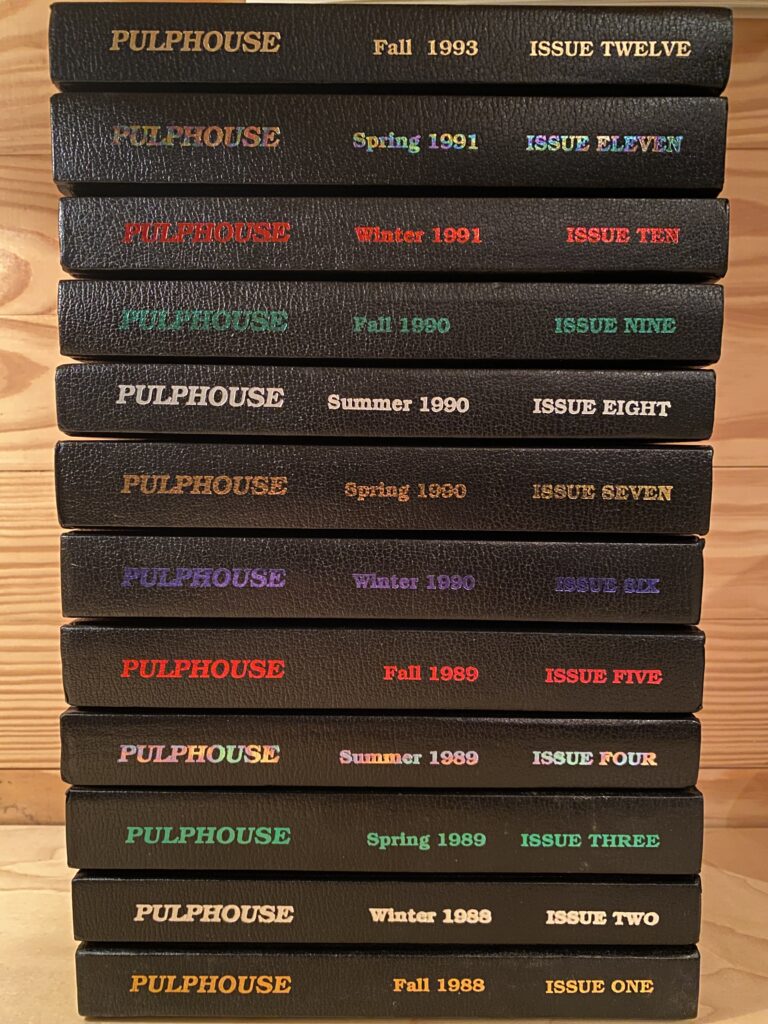
For many years I owned only three copies of this short-lived anthology series—issue #5—which I bought myself—plus issues #4 and #9, which were gifted to me one Christmas many years ago. When the books first came out, from 1988 through 1993, I was a poor college student and bought mostly cheap paperbacks, especially ones I found in the many used bookstores in Austin, Texas at that time (since then, most of those small stores are gone, leaving only the major used book store enterprises). A hardback collection like this series, generally available via mail, was out of my budget and knowledge. The one book I did buy I think I found at an SF convention in the mid-1990s.
While working on collecting another series from the same publisher, the 29 books in the Author’s Choice Monthly series, I came across a few of the hardback magazine books in online catalogs, and I slowly fleshed out my collection from three to 12. I bought the last two that I lacked (issue #1 and #3) at the very end of 2024.
In retrospect, this collection is one that should have worked, had the publishers in place succession plans and had the publishers not over-extended themselves and collapsed so spectacularly. Over the span of 12 issues, this hardback magazine published over 200 short stories (by over 140 individual writers) and slightly more than two dozen non-fiction essays. One writer—Nina Kiriki Hoffman—had a story in each issue, while two others almost shared the same honor—William F. Wu with 11 stories, and Charles de Lint with eight. A rough estimate shows that around half of the stories were by writers who had only one appearance. There’s a huge range of names, from the famous to ones who never quite made it to “the big time.” Short stories are a hard way on which to build your reputation as a writer. Only a few writers focus on the shorter form, and (I think) most readers also tend to read novels; hence anthologies and individual collections are rare and/or receive small print runs from most publishers (unless your name is Stephen King…).
Each issue also had a theme, from horror to science fiction, fantasy to speculative fiction. The issues were also deliberately aimed at the collector’s market, limited to 1,000 copies for the hardback, and a much smaller number for a leather bound edition. Would the series have survived longer without this format? Probably not. From what I’ve read, the publishers went on to try a variety of formats and ventures, from single-short story books, to the Author’s Choice Monthly collections (also in varied formats aimed at collectors), to a magazine. Would it have survived longer if the focus from the publisher was just on the one series, or maybe two? Perhaps. The publisher and editor (and some helpers) have since gone on to stellar careers in the genre, but had they a succession plan in place this might not have prevented the abrupt end.
A contrast to these sort of ventures might be the Little Book series from Borderlands Press. This series chugs along, with an output of maybe 4-6 books a year, each limited to around 500 copies (with a few small exceptions). The price is reasonable upon publication, though in a few cases it climbs quickly after the books are out of print. Other series, and other small press publishers, also have started out with great ambition, then fallen flat. Heck, even major publishers abandon projects. So, 12 is not a bad number.
That all being said, the dozen books in Pulphouse: The Hardback Magazine are a vital part of the history of the small press and genre fiction. I don’t know if it launched careers, but my goal now is to read each and every story in the 12 books this year. It might not happen sequentially within a volume, but I have already started with Volume I, and even averaging a story every day, I should be able to spread it out throughout most of the year. It’s a strange feeling, though, thumbing through the books and looking at the bylines and titles. Many of the authors are now gone, moved onto different worlds, or well-aged and either established writers or former writers. I don’t know if there will be the excitement of discovery in the act of reading these stories. I hope there’ll be some good ones in there, but with more than 30 years having passed since their appearance, it’s a bit like digging through the past, not looking ahead.
![Reblog this post [with Zemanta]](http://img.zemanta.com/reblog_e.png?x-id=527e7588-3c51-4b6d-8ab0-12aa0b19c735)